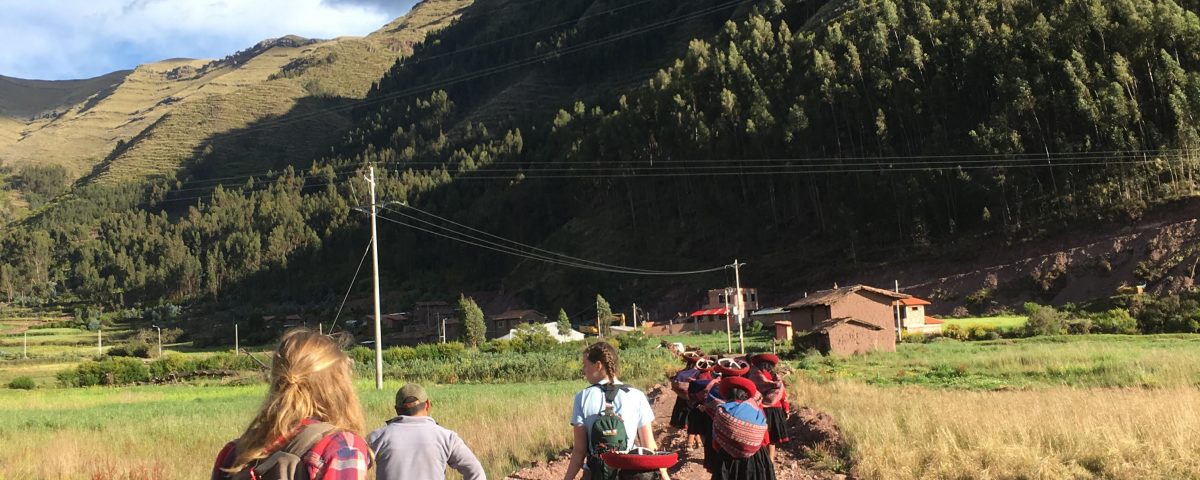Oliverian Abroad: Our Service Trip to Peru
Oliverian Abroad: Our Service Trip to Peru








Eight students traveled with Spanish teacher Bill Kearney and director of academics Abby Hood to build a water system in Peru, service that positively impacted the community and left a profound impression on participants.
This May 3rd to 11th, eight Oliverian students participated in a service trip to Peru that allowed them to greatly expand their horizons — both literally and metaphorically! Led by Bill Kearney, who teaches Spanish at Oli, and Abby Hood, Director of Academics, our students had a transformational experience immersing themselves in another language and partnering with Eagle Condor Humanitarian, a non-profit that works locally to alleviate poverty.
“This trip marks a significant journey,” said Kearney. “Not only was it a long way in terms of distance, it was a huge step for students who hadn’t been out of the country, who hadn’t traveled without their parents, or who were nervous to leave their comfort zone and arrive in a place where they didn’t speak the language.”
According to Kearney, the students were able to turn these anxieties into growth opportunities, stepping further out of their comfort zone with each new challenge. “The fact that our students overcame the nerves they felt beforehand made the trip particularly profound,” he said. “In the end, everyone brought their best to the service project, and our students were able to learn more about the world around them and make a difference in it together.”
Adventure, Exploration, and Service: The Peru Trip Itinerary
The trip made its first stop in Cuzco, exploring the historic city for two days. Next, they moved on to Ocutuan, a village in the Andes where they spent the bulk of the week volunteering with Eagle Condor Humanitarian.
Eagle Condor Humanitarian states that its mission as a global charitable organization is to empower communities in lesser developed areas and break the cycle of generational poverty. It accomplishes this through three main channels: self-reliance business training for individuals and families; nutritional and educational support for children; and infrastructural and community planning. Oli students had the opportunity to contribute to the last category, helping to construct a water system alongside the community members who would benefit from it.
The work was difficult but rewarding. “We hiked straight uphill to the site, dug a trench, laid rocks and a cement foundation, and then began establishing a water tank,” Kearney said. Oli students volunteered with approximately thirty villagers, all of whom contended with challenging conditions. “The weather was sometimes rainy and sometimes sunny, and we were in closer proximity to the sun at high Peruvian altitudes,” he explained. “But, even working at a 12,5000-foot elevation with less oxygen than we’re used to, these guys plugged in and did exactly what was requested.”
Kearney was inspired that students who a few days prior were struggling with anxiety so quickly and completely committed to the project, pick-axes and shovels in hand. “By the time we left, the water system was nearly done,” Kearney said.
Finally, the students made their way to Aquas Calientes in the Urubamba River Valley and saw Machu Picchu before making the long trip home.
The Lasting Impact
The water system itself will serve the Ocutuan community for years to come, and Eagle Condor Humanitarian has documented the powerful effect of its initiatives — of the local families who participate in the organization’s training offerings, nearly half see improvement in average savings within six months following the program.
Of course, the trip to Peru not only contributed to local infrastructure, but also altered the students’ perspectives and will continue to inform their decisions as they leave Oliverian and go out into the world. In the weeks since their return, Kearney estimates that every student on the trip has approached him at least once to reflect on how they’ve grown from the experience. “To watch our students engage and dig in — that was really special,” Kearney says.
